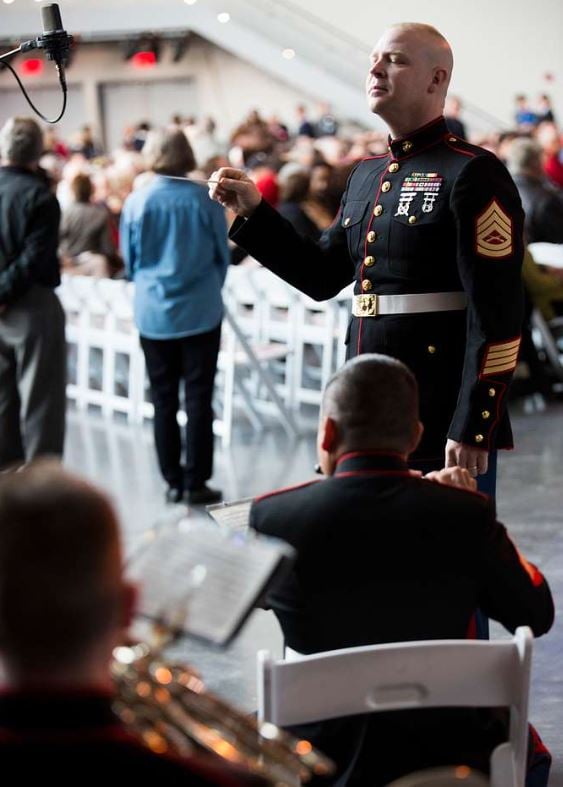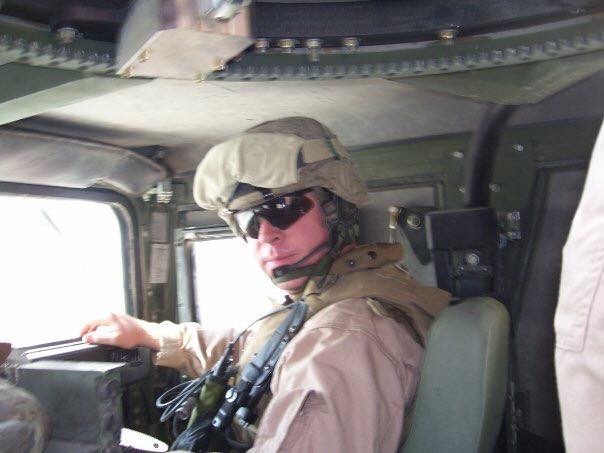
Michael Maschmeier’s vehicle was blasted three times by enemy explosive devices in Iraq.
The soldier came home disabled but with a new ear to his music.
“It has helped me visualize what something should sound like, to describe it without words,” said the Grand Canyon University doctoral learner. “I have written several compositions based on the story of combat.”

Last year, Maschmeier’s new arrangement of the 2nd Marine Division’s “Follow Me” became the division’s official song for all public appearances and was entered into the Marine Corps archives.
It’s just one of the accomplishments in the military career of Maschmeier, who retired as a gunnery sergeant in 2017 and today is a high school band director in Illinois.
Maschmeier was a Marine Corps musician for 20 years, played the euphonium and became a conductor with the 1st Marine Division Band in 2005. But by the following year he was deployed to Iraq.
“Most people don’t understand Marine musicians. Every Marine is a rifleman, so any person in the Marine Corps is trained for combat and you are deployable at any time. We are literally warrior musicians,” he said.
The only notes he was hitting at Camp Fallujah were loud, mostly to his charges as a platoon sergeant and commander of a security convoy within Headquarters Company, Regimental Combat Team 5. He said he led 143 missions through the Al Anbar Provence over 7 ½ months.
On each there was a threat of an improvised explosive device (IED) laid by the enemy – and nine times they hit his convoy and three times his own vehicle.
“But luckily I brought all of my Marines back,” he said, attributing it to daily practice that is all too familiar to a brass player who needs to know their notes.
“Anytime we got hit, my Marines knew what to do and how to do it, minimizing the number getting hurt.”

When Maschmeier’s vehicle was hit on one occasion, it blew off a piece of video equipment used to record and thwart problem areas along the route. He ran after it, putting himself in danger.
“I didn’t want it to fall into enemy hands,” he said.
For his war efforts, he won the Purple Heart and other commendations. But it left a mark.
“When I got blown up a few times running a convoy, it aggravated my back,” he said of an injury suffered in fitness training when he was run over by a vehicle on his bicycle. “It also caused me to get PTSD (post-traumatic stress disorder).”
But upon his retirement, he wanted to continue playing music and teach it to others. He took a job as a middle school band teacher while attaining his Master of Music Performance from the University of Southern Illinois Edwardsville.
Nobody sits on the bench in band, he said, and there is a joy in watching a struggling student finally get it right. He went on to become the director of bands at Marissa (Illinois) Community Unit School District 40, where he has been for the past two years.
He also began composing more with those sounds of war in his ears, rearranging the Marine song “Follow Me” that sounded soft and dated.
“I took the melody and chordal structure and redid everything beyond that,” he said. “Now it sounds more like the Marine Corps acts. That gung-ho is back into the song.”

Maschmeier also said the war helped in his teaching.
“It has informed my daily leadership skills to put things in perspective. I understand this is not the end of the world. Bullets are not flying when we are performing,” he said. “If a kid has a human moment in a performance, it doesn’t stress me out, therefore it doesn’t stress the kids out.
“Nothing rattles me.”
But standing at the podium has worn on his back. He decided he needs to begin work on another avenue of his career in school administration. As such, he is amid his second course toward a Doctor of Education in Organizational Leadership.
“It’s really an effort to use the leadership I learned in the Marine Corps,” he said.
It’s also a way to keep marching forward, though his injuries are limiting in other ways.
“It is really the Marine attitude. There is no quit in us,” he said. “My disabilities are just obstacles I have to overcome.
“If I am not trying to improve myself, I can’t improve my band. I can’t help kids if I am not a good example.”
Grand Canyon University senior writer Mike Kilen can be reached at [email protected] or at 602-639-6764.
***
Related content:
GCU News: Three GCU degrees are researcher's therapy and hope for others after tragedy



































































